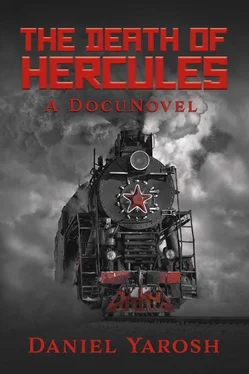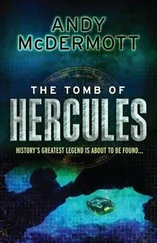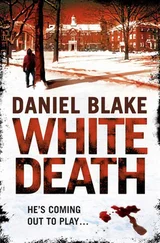“What happened?” Max asked.
“What happened? What happened? I was awarded the Red Star of the State by Comrade Commander Antonov-Ovseenko! My men were better fed and had more equipment than most of the Red Army.”
“Yes, Marusya,” Max said a little tipsy. “Yes, but what happened to your army?”
Marusya made a great show of pouring two more shots, and they clinked glasses as they drank them down.
“Let me tell you something. The Bolsheviks are babies. They are hypocrites. They talk about commune ownership, and the end of property. But just watch a Bolshevik commander take an estate from the bourgeoise. They take everything in sight. And does it go back to the State? No. It never leaves their pockets.”
“It’s like that everywhere,” Max moaned.
“It is… But not with me! Everything I took we divided among ourselves. We liberated the wealth for the people. I kept only my share.” She poured and they drank again.
“Yes,” Max mumbled. He looked at Marusya in the dwindling firelight, and she reflected a glow, her eyes twinkling and her arms gesturing.
“That is why they accused me of pillaging! To cover up their own sins! A trial!” she cried.
“Is that when you were insubordinate?” Max asked, wobbling side to side with a goofy grin.
“Yes, it was,” she said, and spreading her coat, she fell onto him. Her hot breath, soft body and wet lips transported him. This did not pretend to be love, but just pure lust. This felt like his visits to the brothels outside the Army camp base in France, except no guilt and no money. For both Max and Marusya, the imminent combat the next day sharpened the excitement and release.
**********
Just after midnight on the morning of Saturday, February 15, two dozen men from the Belgorod and Podolsk divisions crept out of their barracks and headed to the railway station. They easily overwhelmed the sleeping guards, and took up positions around the yard, overlooking the two locomotives. Then they sat and waited.
At dawn Kotovsky’s militia were arrayed along the north bank of the Pivdennyi Bug River, carefully watching. Some watched for signs from the church steeple in the center of the city that the local Bolsheviks had started battle, while others watched the north roads for the Bolshevik reinforcements from Kharkiv promised by the Central Command.
After two hours of inaction on either front, Kotovsky could wait no longer. He sent a scout troop into the city, and what they saw was disheartening. The town square was littered with several bodies of men shot at close range, and a few more men in civilian clothes kneeled in a group with their hands behind their heads, guarded by Cossack soldiers. They then crept south to view the train station, where more bodies in military uniforms lay in the rail yard, and soldiers milled about. There did not appear to be any surviving rebels there. The troop hurried back to Kotovsky to report the uprising had failed miserably.
Ivan Semesenko slept poorly that Friday night, worried about the resistance. His testicles ached from his venereal disease and he had to go outside to urinate every two hours. The congratulations he received by wire from Directorate leader Simon Petliura had come with instructions: hold Proskuriv against the Jews and Bolsheviks at all costs, and help was on the way. He was grumpy and irritated when his adjunct woke him again to tell him of the beginning of the uprising. He dressed quickly and called in his senior commanders. When he asked who it was they captured in town, they responded with one word: “Jews!” He then gave his instructions and hurried out by truck transport with his security detail to inspect the railway station and bolster the morale of the shaken Belgorod and Podolosk regiments. He returned to his headquarters in the town hotel to wire reports to Petliura in Kyiv and orders to his regional commanders in and around Odessa.
By noon a large squadron of 200 uniformed and fully armed Cossack soldiers assembled in the main town square across from the hotel, complete with a military band. A scattering of townspeople gathered at the perimeter, apprehensive of the darkening mood. An adjutant placed down a wooden box and signaled to the band to stop playing. Semesenko emerged from his truck and climbed the short step onto the wood box, wincing when his adjutant helped him by his elbow.
Semesenko started out his speech with effusive praise for his troops, noting their quick action in quashing the Bolshevik rebellion. He singled out the loyalty of the Cossack regiments near the train station who caught their own traitors. This led him to the perfidy of treachery, and his voice rose, and his face flushed. Then his eyes narrowed, and his voice growled as he denounced the risk of Bolshevism to the Ukraine motherland. This was standard fare, and the soldier’s attention drifted. He then raised his voice to ask, “Who knew who was behind the Bolsheviks?” A pregnant pause. “The Jews!” and he launched into a tirade against Jewish control of the Bolsheviks who threatened the very life their families knew in the Ukraine. This was new territory even for Semesenko, the commanders thought.
He thrust his finger in the air and commanded “Kill the Jews and Save the Ukraine!” One overwrought captain repeated “Kill the Jews and Save the Ukraine!” Soon they were all chanting. At first this seemed to the gathered soldiers to be rhetorical bombast, but Semesenko raised and lowered his arms to calm them down. “I do not want you raiding their houses, their hovels. You are not to steal their goods. We are not doing this for our own benefit, but for the victory of our Motherland!” It then became clear to all that he really meant they should kill. “For our Motherland,” the captain cried. “For our Motherland,” the troops replied. A few civilians standing in the periphery repeated the cry. The band struck up a military march for a brief moment, and then Semesenko quieted them again. “Form up in your squadrons,” he said. Then, pointing to the townspeople gathered behind the troops he called out, “you there. We need you to defend our Motherland. We will take you with us.” Each soldier found his unit, and then looked in the eyes of the other. To them, the threat was real – rebels in this town had tried to kill them. Their commander was clear. Their unit was formed. Action was inevitable.
The squadrons spread over the town, accompanied by residents who led them to the Jewish sections that comprised half of Proskuriv. It was a Saturday Shabbos , and late in the day families were gathered at home, mothers preparing the evening meal and men preparing to return to the synagogue for sabbath ending services. A few Jewish men poked their heads out of their front doors to see about the commotion in the street. This only served to identify their homes as targets.
The military units broke down doors, dragged men to the streets and shot them. The Jewish women who came out to intervene were beaten with rifle butts and batons and left in heaps as they moved to the next home. After the first few houses, to conserve ammunition, the Jewish men were beaten to death, too. True to their commander’s orders, there was no looting. Some soldiers were reluctant at first, but with the flow of blood the pent-up anxieties and frustrations of occupying a hostile city were released in blows and cudgels. It was exhausting work, and after a few hours the units headed back to camp. They left 390 men, 309 women and 76 children dead in the streets. An additional 500 Jews were wounded and many crippled. They staggered to the small Jewish hospital, which was overwhelmed with broken bodies.
In the town of Bender, just outside of Odessa, Ukrainian Army privates Igor Lemevsky and Petr Dronov had gotten an early start on Saturday night drinking. At about sunset they were summoned from the saloon by their commander, and they assembled with 50 other men at their camp. They listened, a little tipsy, to the usual harangue about the Bolsheviks destroying the Ukraine, and now the Jews. “The Jews are the gravest threat,” he shrieked. Lemevsky and Dronov had no political convictions and were happy just to be paid almost every week. Then came surprising news – the worst of the Jews were in their very town of Bender! They were given instructions – search the town and kill the Jews. Property was not to be taken – just kill Jews.
Читать дальше












